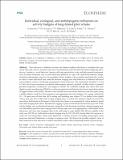Individual, ecological, and anthropogenic influences on activity budgets of long-finned pilot whales
Date
27/12/2017Author
Grant ID
N00014-12-1-0204
N00014 08 1 0984
Keywords
Metadata
Show full item recordAbstract
Time allocation to different activities and habitats enables individuals to modulate their perceived risks and access to resources, and can reveal important trade-offs between fitness-enhancing activities (e.g., feeding vs. social behavior). Species with long reproductive cycles and high parental investment, such as marine mammals, rely on such behavioral plasticity to cope with rapid environmental change, including anthropogenic stressors. We quantified activity budgets of free-ranging long-finned pilot whales in order to assess individual time trade-offs between foraging and other behaviors in different individual and ecological contexts, and during experimental sound exposures. The experiments included 1-2 and 6-7 kHz naval sonar exposures (a potential anthropogenic stressor), playback of killer whale (a potential predator/competitor) vocalizations, and negative controls. We combined multiple time series data from digital acoustic recording tags (DTAG) as well as group-level social behavior data from visual observations of tagged whales at the surface. The data were classified into near-surface behaviors and dive types (using a hidden Markov model for dive transitions) and aggregated into time budgets. On average, individuals (N=19) spent most of their time (69%) resting and transiting near surface, 21% in shallow dives (depth <40m), and only 10% of their time in deep foraging dives, of which 65% reached a depth 10m from the sea bottom. Individuals in the largest of three body size classes or accompanied by calves tended to spend more time foraging than others. Simultaneous tagging of pairs of individuals showed that up to 50% of the activity budget was synchronized between conspecifics with decreased synchrony during foraging periods. Individuals spent less time foraging when forming larger non-vocal aggregations of individuals in late afternoons, and more time foraging when in the mid-range of water depths (300-400m) available in the study area (50-700m). Individuals reduced foraging time by 83% (29-96%) during their first exposure to sonar, but not during killer whale sound playbacks. A relative increase in foraging during repeat sonar exposures indicated habituation or change in response tactic. We discuss the possible adaptive value of these trade-offs in time allocation to reduce individual conflict while maintaining benefits of group living.
Citation
Isojunno , S , Sadykova , D , DeRuiter , S , Curé , C , Visser , F , Thomas , L , Miller , P J O & Harris , C M 2017 , ' Individual, ecological, and anthropogenic influences on activity budgets of long-finned pilot whales ' , Ecosphere , vol. 8 , no. 12 , e02044 . https://doi.org/10.1002/ecs2.2044
Publication
Ecosphere
Status
Peer reviewed
ISSN
2150-8925Type
Journal article
Description
The authors would like to thank sponsors, NL Ministry of Defence, NOR Ministry of Defence, U.S. Office of Naval Research (N00014-08-1-0984, N00014-10-1-0355, N00014-14-1-0390), FR Ministry of Defence (DGA; public market no. 15860052), World Wildlife Fund Norway (9E0682), and French Total Foundation and Bleustein-Blanchet Foundation. The statistical development work was supported by a separate grant from the U.S. Office of Naval Research (N00014-12-1-0204), under the project entitled Multi-study OCean acoustics Human effects Analysis (MOCHA).Collections
Items in the St Andrews Research Repository are protected by copyright, with all rights reserved, unless otherwise indicated.

